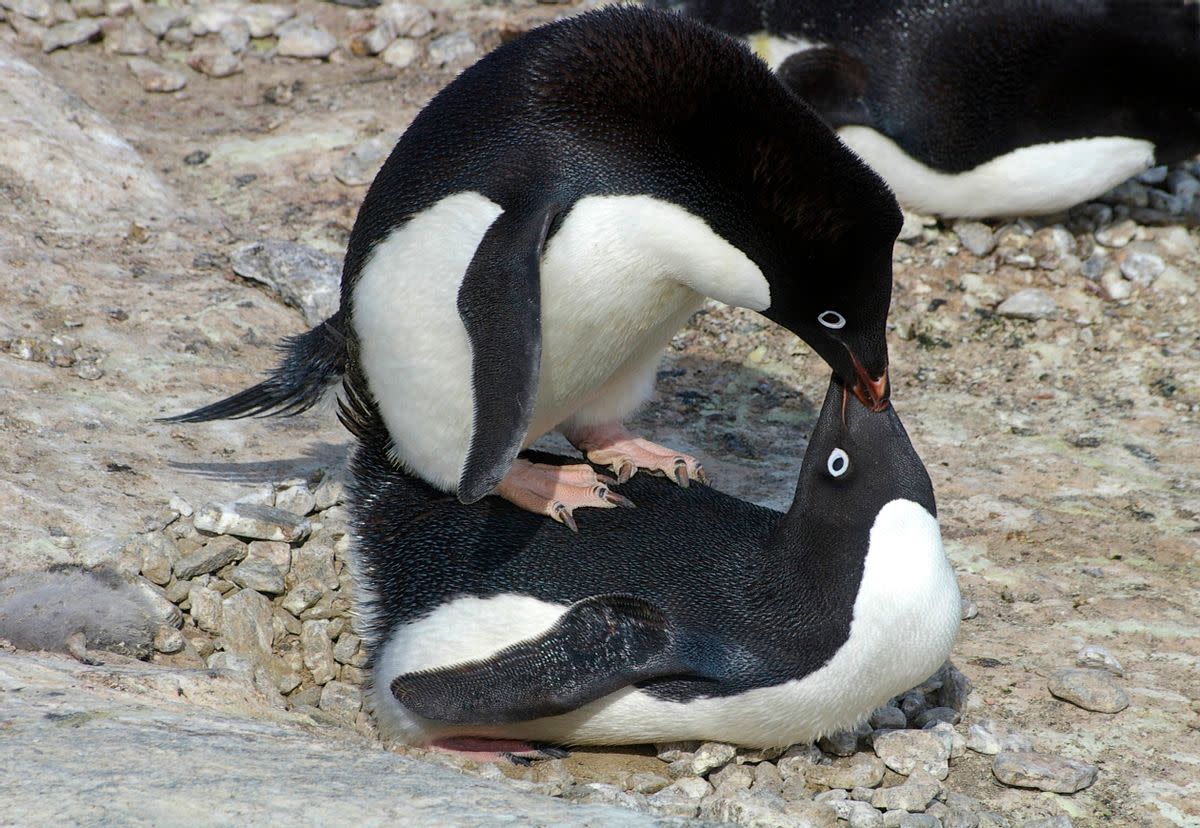Fact Check: Rumor Claims Penguins Trade Sex for Pebbles. Here's What Happens

Claim:
Penguins trade sex acts for pebbles, which they use for their nests.
Rating:
Context:
The practice has been observed among Adélie penguins.
For years, people have claimed that penguins trade sex acts for pebbles they use to build their nests:
Also some female penguins have been observed performing the mating dance but not putting out and STILL getting nice rocks so stripper penguins also exist
— Byron Dubois (@Byron_DuBois) March 27, 2018
This rumor has spread online since at least 2018, including on Reddit:
TIL some female penguins engage in prostitution. Performing sex act in exchange for pebbles. However, sometimes they will just trick the male into thinking they’ll have sex, then run off once she gets the pebble.
by in todayilearned
This claim is true: The first report of such behavior among Adélie penguins was published in 1998 in The Auk, a peer-review journal since renamed Ornithology:
Adélie Penguins are monogamous and breed in large colonies in Antarctica.
…
The following account is based on 10 observations involving at least five different females, seen over the four seasons of study. In each case, a female joined a single, unpaired male at his nest site; courtship was followed by the female lying prone at the male's site. The male then mounted and copulated with the female.
…
Following each copulation, the male dismounted from the female, and she picked up a stone from his nest site and left immediately.
Five of the females returned to take a second stone, the article said. As they returned to their nests, it became obvious to the observer that the females were already pair-bonded to other males. Further study revealed that some females would engage unattached males in courtship behavior and the males would let them make off with a stone without aggression and without forcing copulation.
Adélie penguins use pebbles and stones to build their nests. The larger the nests, the more resistant they are, leading penguin pairs to collect as many stones as possible. But single males have more time to collect stones, and appear to be a good source of pebbles. Interestingly, the article recorded no instance of male courting females for pebbles, suggesting the behavior was based on sex.
The study also indicated that in most cases of extrapair copulation, the male was successful at inseminating the female (with a low percentage of "misses"). While researchers seemed to wonder what, exactly, males gained from this trade, it appears some might be able to spread their genes in this way even before finding their mate.
The sex lives of Adélie penguins were first reported in 1911 by George Murray Levick, a scientist with the 1910-13 Scott Antarctic expedition. Levick spent all of the Antarctic summer of 1911-1912 observing a colony of Adélie penguins and witnessed several behaviors that would deeply unsettle the scientific community: Males would force females and chicks into sex, crushing and sometimes killing them; there were occasional homosexual pairings; there was necrophilia (when males would try to mate with dead females); and collective coerced sex. He recorded his findings in a short book called "Sexual Habits of the Adélie Penguin" and tried to have it published.
But his findings were deemed so horrific and depraved no scientific journal agreed to publish them on his return to England. It took decades for scientists to make the same observations again. When they did, the researchers chalked these behaviors up to the inexperience of young males, who hadn't learned what is appropriate and what isn't. Young males might not yet know which individuals make good mates, for example, or confuse a dead penguin with a compliant female. The same ignorance may explain the ability of more-experienced paired females to coax younger males into giving them stones.
Biologists and animal behavior experts have reported other instances of transactional sex among animals. For example male carib hummingbirds will defend flowers full of nectar unless a female engages them in courtship. It appears that female chimpanzees will trade sex for fresh meat. And lastly, when a team of researchers taught capuchin monkeys to use "money," they found them using it to "pay" for sex.
Sources:
Cooke, Lucy. 'Penguin Prostitution Is a Thing'. The Atlantic, no. June 2018, https://web.archive.org/web/20220309153643/https://www.theatlantic.com/magazine/archive/2018/06/penguin-prostitutes/559133/.
Dubner, Stephen J., and Steven D. Levitt. 'Monkey Business'. The New York Times, 5 June 2005. NYTimes.com, https://www.nytimes.com/2005/06/05/magazine/monkey-business.html.
Gomes, Cristina M., and Christophe Boesch. 'Wild Chimpanzees Exchange Meat for Sex on a Long-Term Basis'. PLoS ONE, vol. 4, no. 4, Apr. 2009, p. e5116. PubMed Central, https://doi.org/10.1371/journal.pone.0005116.
Hunter, F. M., and L. S. Davis. 'Female Adélie Penguins Acquire Nest Material from Extrapair Males after Engaging in Extrapair Copulations'. The Auk, vol. 115, no. 2, 1998, pp. 526–28, https://sora.unm.edu/sites/default/files/journals/auk/v115n02/p0526-p0528.pdf.
Kubny, Heiner. 'Adélie Penguins – the Stone Thieves'. Polarjournal, https://polarjournal.ch/en/2021/11/23/adelie-penguins-the-stone-thieves/. Accessed 3 June 2024.
'Penguin Prostitution'. PenguinWorld, http://www.penguinworld.com//features//features/prostitution.html. Accessed 3 June 2024.
'Pick Up a Penguin'. BBC News, 26 Feb. 1998, https://web.archive.org/web/20170806115308/http://news.bbc.co.uk/2/hi/asia-pacific/60302.stm.
Wolf, Larry L. '"Prostitution" Behavior in a Tropical Hummingbird'. The Condor, vol. 77, no. 2, Apr. 1975, pp. 140–44, https://doi.org/https://doi.org/10.2307/1365783.



